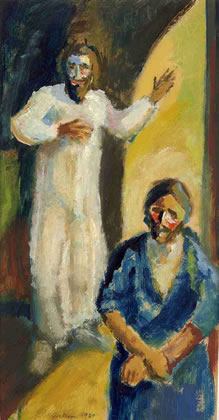The Jesus Prayer
Week of Monday October 18, 2004
Lectionary Readings (Revised Common Lectionary, Year C)
Joel 2:23–32
Psalm 65 or Jeremiah 14:7–10, 19–22
Psalm 84:1–7
2 Timothy 4:6–8, 16–18
Luke 18:9–14
Luke's Gospel for this week tells the parable of the Pharisee and the tax collector (18:9–14), in which we discover two ways of being religious. Sadly, only one of them is truly life-giving.
9To some who were confident of their own righteousness and looked down on everybody else, Jesus told this parable: 10"Two men went up to the temple to pray, one a Pharisee and the other a tax collector. 11The Pharisee stood up and prayed about himself: 'God, I thank you that I am not like other men—robbers, evildoers, adulterers—or even like this tax collector. 12I fast twice a week and give a tenth of all I get.' 13But the tax collector stood at a distance. He would not even look up to heaven, but beat his breast and said, 'God, have mercy on me, a sinner.' 14I tell you that this man, rather than the other, went home justified before God. For everyone who exalts himself will be humbled, and he who humbles himself will be exalted." (NIV)
 |
The Pharisee and the Publican |
Luke construes the two characters in this story as polar opposites. The Pharisee was religiously righteous, the tax man an extortionist for the Roman oppressors. The former was smug, sanctimonious, and confident, the latter anxious, insecure and timid. The Pharisee strode up to the temple, the sinner could only stand at a distance, as if his physical separation from the holy site expressed his spiritual alienation. The righteous one stood up, the sinner looked down. The Pharisee prayed loudly about himself, the tax collector could barely pray at all. The Pharisee puffed out his chest, the publican beat his breast. As in so many Gospel stories that subvert conventional, human wisdom, the parable punch line culminates with a reversal: the respectable, reputable believer, so competent and accomplished, the one who had done everything right, was rejected, whereas the irreligious sinner, disreputable, inadequate and incompetent, was justified by God.
It would be hard to conjure a more earnest, conscientious religious person than the Pharisee; he prayed, he fasted, and he tithed. His spiritual regimen was stringent, to say the least. But he made two tragic mistakes in his religious life, one about himself, and one about others.
The Pharisee, writes Luke, "looked down on everybody else." For some reason, contempt and disparagement of others lurks in the human heart; at least it does in mine, bubbling up all too easily and frequently. Somehow, we imagine that in tearing down others we build up ourselves, or that we will compare favorably. The point is not that others do not sometimes earn and even deserve, at some level, moral opprobrium. It is not that they are not as bad as we think; no, they might even be worse than we know. The Psalmist for this week, for example, describes a person more like the tax collector, one who is "overwhelmed by sins" (Psalm 65:3). Or again, a friend may have scorned and vilified you when you had failed miserably, kicked you when you were down (all in the name of righteousness, of course). To disparage them as a sanctimonious hypocrite feels ever so delicious, but that is a dark place that Jesus warns us not to go. We harm people when we do this to them. Even worse, while thinking we elevate ouselves, we harm our own selves.
"We all stumble in many ways," wrote the Apostle James (3:2), and for many reasons, sometimes by our own poor choices, and at other times through no fault of our own. What we need when we fail is not moral condescension but human compassion, not humiliation but empathy, not shame but hope. I have always loved the tender wisdom of St. Maximos the Confessor (seventh century): "The person who has come to know the weakness of human nature has gained experience of divine power. Such a person never belittles anyone...He knows that God is like a good and loving physician who heals with individual treatment each of those who are trying to make progress." Knowing my own many weaknesses and failures, God save me from Pharisaically "looking down on everybody else."
 |
Pharisee and the Tax Collector |
The flip side of condescension toward others is self-justification, and this was the Pharisee's second mistake. Luke writes that the Pharisee thanked God that he was "not like other people"—a thief, an evildoer or an adulterer. His religious narcissim was really a form of spiritual self-justification, of which there are almost endless permutations. Ethical self-justification assures me that "I'm as good or better than the next person." Therapeutic self-justification is big these days in the self-esteem movement. We justify ourselves academically (GPA and SAT), institutionally ("This is where I went to school thirty years ago"), financially ("I'm frugal toward myself and generous to others"), familially ("Aren't my kids great?"), athletically ("I'm in shape, you're a slob"), politically ("My vote is enlightened, yours is ideological"), and professionally ("I work at X; what do you do?"). A common form of self-justification is by zip code ("Where do you live?"), a thinly veiled insinuation that net worth is a reliable index of self worth. I think I have tried versions of all of these at one time or another; they don't work. Society is relentless in demanding proofs and justifications from us, and it is so very easy to take the bait, especially if you are an accomplished person with lots of ammunition who—in all modesty, right?—can rise to the challenge.
The Lutheran tradition construes all such efforts at self-justification as a form of idolatry. Lutherans, thank God, always bring us back to the essential notion that our only justification comes from God and by God in Christ: "The fundamental point is always justification by faith. Seeking life in 'creatures, saints and devils'—trying to find the significance or value of one's self in personal terms, attempting to establish an identity beyond God's judgment, is idolatry. In older language, it is 'justification by works,' whether the doings are religious or apparently irreligious, pious or profligate." 1 In this Lutheran scheme of things, we relinquish all forms of self-justification for the only justification that works or even matters—that which comes from God.
I find it scary to live without efforts of self-justification; to do so makes me feel vulnerable and naked. But at its best, living without self-justifications is extraordinarily liberating. Having been embraced by a God who longs to redeem broken sinners, you never, for any reason, need to prove yourself. According to Luke's Gospel for this week, to get to this place takes just seven words, those mumbled by the tax collector as he stood at a distance and stared at the ground: "God, have mercy on me, a sinner." The moment we utter those words and cast our unadorned selves upon God, we experience His love without conditions or limits.
In the history of Christian spirituality the tax collector's prayer is often extended to ten words, and called The Jesus Prayer: "Lord Jesus Christ, Son of God, have mercy on me." Correctly understood, and spoken from the heart, that is the most important prayer anyone can utter, and in a sense the only prayer you ever need. Why? Because it proceeds from a clear-eyed appraisal of our broken human condition and, more importantly, from confidence in the character of a God who welcomes the anxious sinner and even the self-righteous saint.
[1] James Nestingen, "The Lutheran Reformation and Homosexual Practice," in James Childs, editor, Faithful Conversation; Christian Perspectives on Homosexuality (Minneapolis: Fortress Press, 2003), p. 56.





